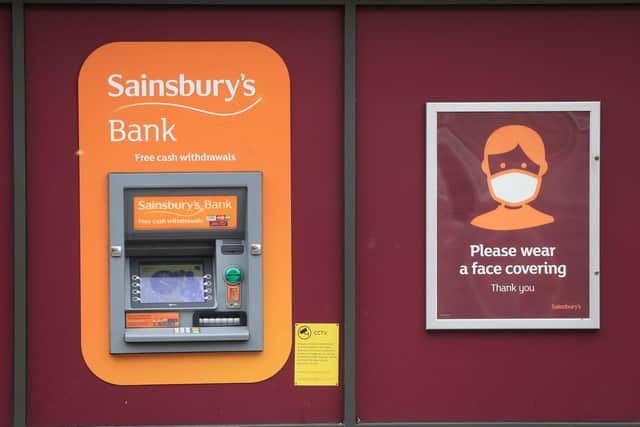Why RBS owner NatWest is buying Edinburgh-based Sainsbury’s Bank and what customers should do next
NatWest boss Paul Thwaite has described a deal to acquire the bulk of Edinburgh-based Sainsbury’s Bank, adding one million customer accounts, as a “great opportunity” to grow the group’s retail banking business.
The agreement struck between the Royal Bank of Scotland parent and the supermarket giant will see NatWest acquire £1.4 billion of unsecured personal loans, £1.1bn of credit card balances and about £2.6bn of customer deposits. As part of the transaction NatWest Group expects to add around one million customer accounts.
Advertisement
Hide AdAdvertisement
Hide AdThe move comes after Sainsbury’s announced in January it was winding down its banking division to focus on its retail business, which also includes Argos. The deal with NatWest is expected to go through in March next year and Sainsbury’s will pay the banking group £125 million when it completes to take on its core banking assets and liabilities, although the final consideration will be confirmed on completion. Sainsbury’s expects to return at least £250m in excess capital to shareholders after the deal.


Sainsbury’s Bank, which began more than two decades ago as a joint venture between the retailer and Bank of Scotland before Sainsbury’s took full ownership in 2014, had been at the centre of speculation for some time. Takeover talk circulated in late 2020 when the group confirmed that it had received some “very preliminary expressions of interest” in the bank. It opted some months later to retain its Edinburgh-based banking arm after deciding against a sale.
Sainsbury’s said there would be no immediate changes to its banking customers’ terms and conditions, adding they “do not need to take any action”. It noted that the sale does not include Sainsbury’s Bank’s commission income businesses, such as insurance, cash points and travel money. Argos Financial Services is also not included in the deal.
The retailer is following in the footsteps of larger rival Tesco, which offloaded most of its banking activities to Barclays in a £600m deal earlier this year.
Thwaite, who was formally appointed NatWest chief executive earlier this year following the departure of Dame Alison Rose, said: “We look forward to welcoming new customers to NatWest Group, where they will benefit from our expertise and award-winning digital banking offering. This transaction is a great opportunity to accelerate the growth of our retail banking business at attractive returns, in line with our strategic priorities. As well as a complementary customer base, the transaction is expected to add scale to our credit card and unsecured personal lending business within existing risk appetite.”
Sainsbury’s chief executive Simon Roberts added: “NatWest’s values and customer focus are a close fit with ours and as one of the UK’s leading banks, NatWest’s scale and financial services expertise will ensure our existing financial services customers continue to be well looked after. There will be no immediate change for our bank customers as a result of this announcement.”
Sophie Lund-Yates, lead equity analyst at investment platform Hargreaves Lansdown, said Sainsbury’s decision to offload the operations “isn’t a surprise”, but showed the group’s willingness to “grasp the nettle and refocus on its core business”.
She added: “Competition in the supermarket space is fierce and remaining competitive is a very expensive undertaking, and one Sainsbury’s has fared better at than feared. Other finance assets, including ATMs and travel money are remaining in Sainsbury’s fold, as their capital light and profitable models remain attractive to the group.
Advertisement
Hide AdAdvertisement
Hide Ad“The change shouldn’t make too much difference to existing customers, and from NatWest’s perspective, the deal makes a lot of sense, but is unlikely to markedly move the dial.”
Will Howlett, financial analyst at Quilter Cheviot, noted: “In the landscape of UK banking, NatWest’s acquisition of Sainsbury’s banking division is a modest one. However, it’s the strategic implications that are of interest here.
“This move is indicative of the ongoing consolidation trend within the banking sector, which we have been anticipating. The acquisition allows NatWest to diversify its offerings and tap into Sainsbury’s established customer base, potentially leading to a more integrated financial services model within the retail space.
“While the scale may be small relative to NatWest’s existing operations, the long-term potential for cross-selling and deepening customer relationships could be significant.”
Comments
Want to join the conversation? Please or to comment on this article.